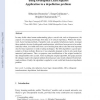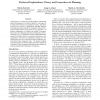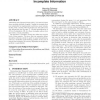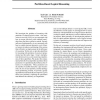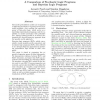465 search results - page 35 / 93 » Knowledge and the Problem of Logical Omniscience |
105
click to vote
CORR
2008
Springer
14 years 12 months ago
2008
Springer
In many fields where human understanding plays a crucial role, such as bioprocesses, the capacity of extracting knowledge from data is of critical importance. Within this framewor...
113
click to vote
AAAI
2011
13 years 12 months ago
2011
In this paper we examine the general problem of generating preferred explanations for observed behavior with respect to a model of the behavior of a dynamical system. This problem...
ATAL
2010
Springer
15 years 29 days ago
2010
Springer
Alternating-time Temporal Logic (ATL) [1] is used to reason about strategic abilities of agents. Aiming at strategies that can realistically be implemented in software, many varia...
KR
2000
Springer
15 years 3 months ago
2000
Springer
We investigate the problem of reasoning with partitions of related logical axioms. Our motivation is two-fold. First, we are concerned with how to reason effectively with multiple...
ILP
2000
Springer
15 years 3 months ago
2000
Springer
First-order probabilistic models are recognized as efficient frameworks to represent several realworld problems: they combine the expressive power of first-order logic, which serv...
